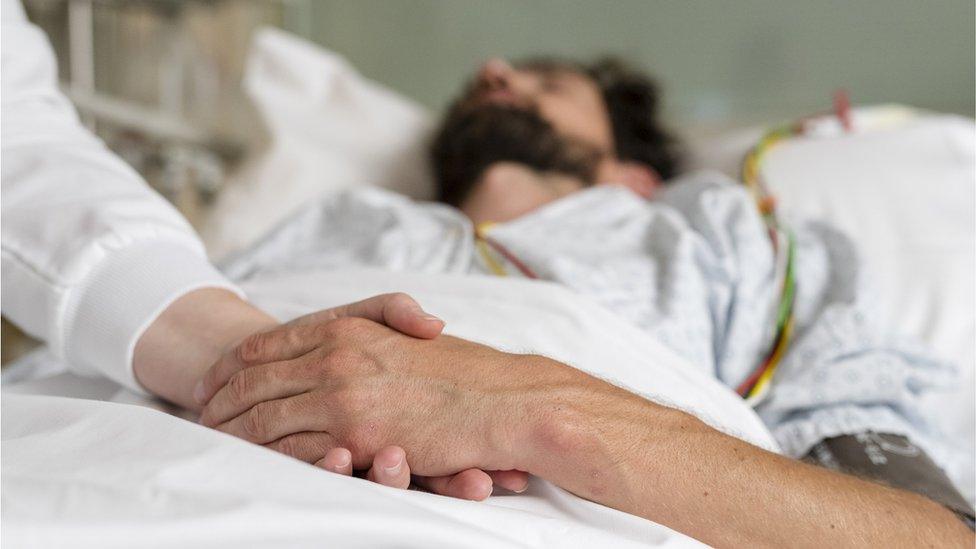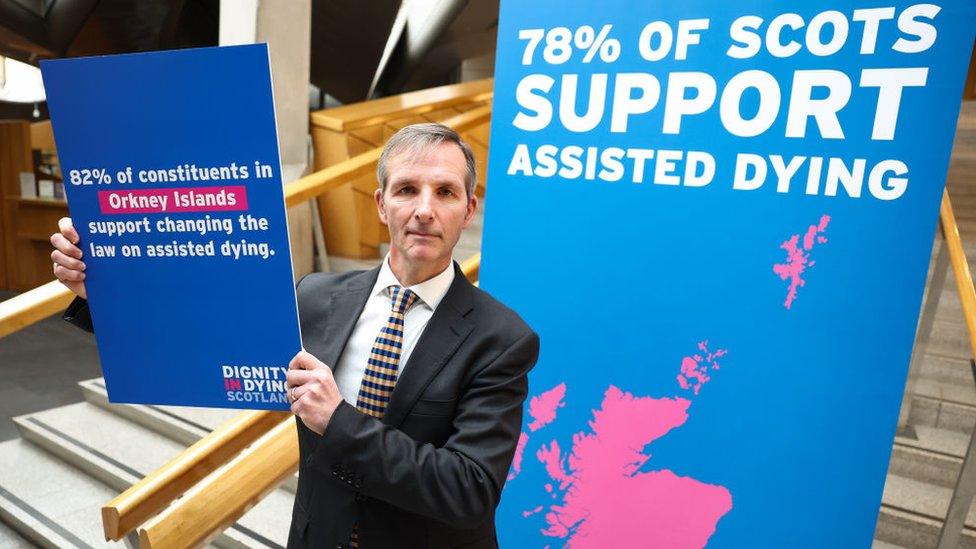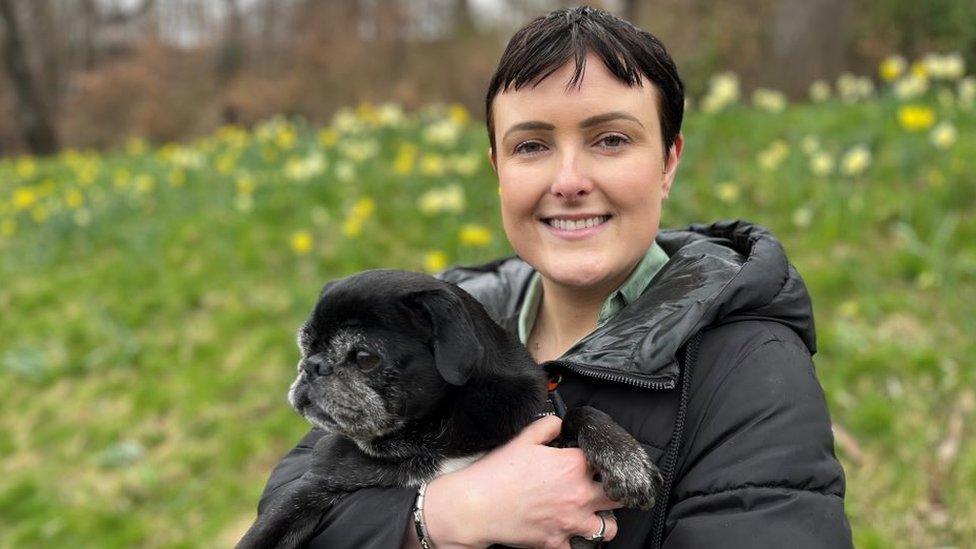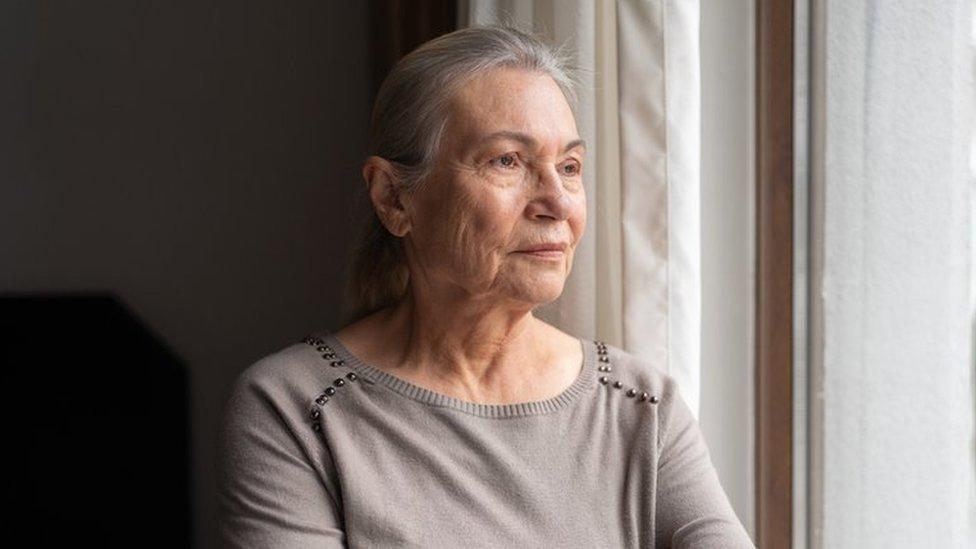Assisted dying: Sinn Féin and SDLP would consider change to law
- Published

Assisted dying is currently illegal in Northern Ireland
Sinn Féin and the Social Democratic and Labour Party (SDLP) both say they would consider supporting a change to the law to allow assisted dying for people with a terminal illness.
The parties make it clear there would need to be safeguards in place to ensure any new laws were not abused.
Assisted dying is currently illegal in Northern Ireland.
But there are moves in the UK, and the Republic of Ireland, to bring in new legislation on the issue.
A bill to legalise assisted dying for terminally-ill people in Scotland was introduced at Holyrood on Thursday.
Supporters of the legislation say it would ease suffering, but opponents are concerned that some terminally ill people may feel under pressure to end their lives.
The debate on the issue has become more high profile since the announcement last year by the broadcaster Dame Esther Rantzen that she had joined the Dignitas assisted dying clinic in Switzerland.
There are differing views among political parties in Northern Ireland.
The Democratic Unionist Party (DUP) and Traditional Unionist Voice (TUV) are strongly opposed to any legislative change, while others take a more flexible approach.
A Sinn Féin spokesperson said: "In principle we support legislating for assisted dying in certain circumstances and with robust safeguards, but the legislation should only be progressed once the appropriate services and supports are available."
Those "appropriate" services and supports would include counselling and palliative care.
The SDLP says it "is open to a change in the law and we think it's appropriate for Westminster to consider the issue".
A party spokesperson added: "We would need to see the detail of any proposed legislation but there would, of course, have to be a raft of protections built in so that there's no abuse of legal changes and so that people aren't made to feel that they're a burden or could be treated as a burden because of age or ill health."

A vote in Scotland is expected next year
The bill in Scotland contains a number of proposed restrictions, including:
Assisted-dying would only be available to people aged over 16
Two doctors would have to be satisfied the patient's condition was terminal
It would only be open to people who have lived in Scotland for at least a year
There would be a 14-day "reflection" period between making a request and being given the necessary medication.
Even with safeguards, the DUP is opposed to any changes to any assisted dying laws affecting Northern Ireland.
Upper Bann MP Carla Lockhart said the focus should be on "protecting life at all stages, even when life is at its most challenging".
"We need to make clear that the primary objective of our healthcare system is to protect life, to heal and to improve the quality of life of everyone, whatever illness they face," she said.
"Our focus instead should be on improving palliative care, allowing the terminally ill to die with true dignity."
A vote in Scotland is expected in 2025.
In the House of Commons in 2015, MPs rejected a bill on allowing terminally ill people to end their own life by 330 votes to 118.
Since that vote there have been calls for a further debate.
Labour Party leader Sir Keir Starmer has said there are "grounds for changing the law" on assisted dying.
'Emotive and complicated'
Back in Northern Ireland, a spokesperson for the Alliance Party said: "As with all beginning and end of life issues, it's a conscience issue for us."
Assisted dying is an "emotive and complicated issue", according to the Ulster Unionist Party (UUP).
A spokesperson said: "This would be a conscience issue [for the UUP] and elected members would have a free vote if it were ever to be brought forward."
The TUV manifesto states: "Just as we support the rights of the unborn, so at the end-of-life stage, we oppose euthanasia."
In the Republic of Ireland, an Oireachtas (parliament) committee recently called on the government to legalise assisted dying, external in certain restricted circumstances.
This followed a series of hearings which included evidence on how assisted dying operates in Switzerland, New Zealand, Australia, the Netherlands, Canada and the United States state of Oregon.
A recent report by the Assisted Dying Coalition suggested that three people from Northern Ireland had recently died at the Dignitas clinic in Switzerland.
The group said its research showed that between 2022 and mid 2023, two people from County Antrim and one from County Down went to Dignitas.
Earlier this month, campaigners in favour of assisted dying held a public meeting in Bangor, County Down.
Related topics
- Published28 March 2024

- Published29 February 2024

